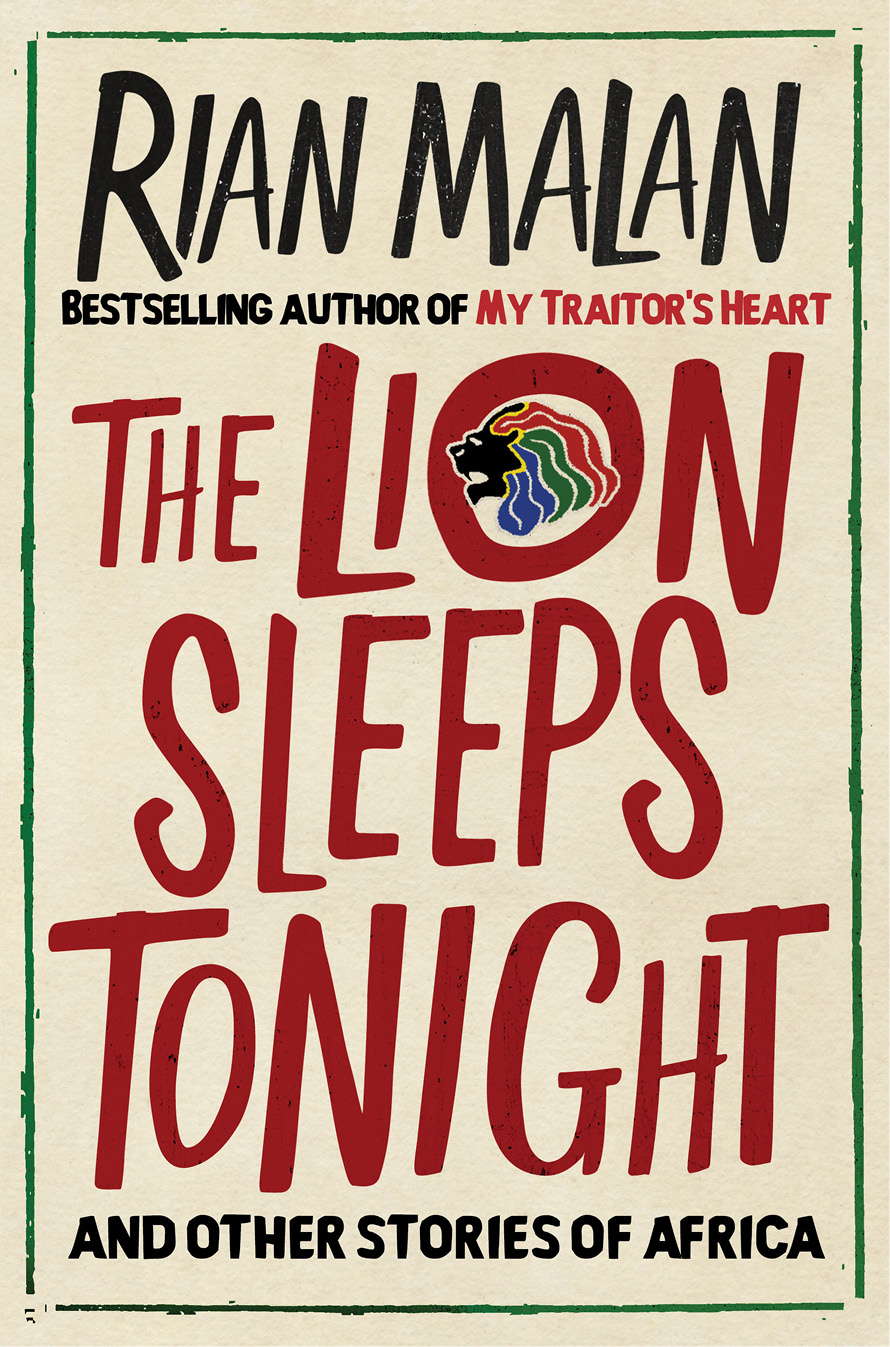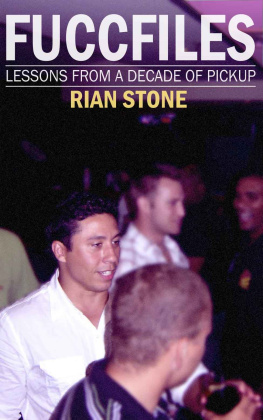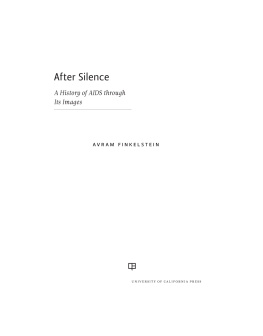
The Lion
Sleeps
Tonight
Also by Rian Malan
My Traitors Heart
The Lion
Sleeps
Tonight
and Other Stories of Africa
Rian Malan

Grove Press UK
First published in the United States of America
in 2012 by Grove/Atlantic Inc.
First published in Great Britain in 2013 by Grove Press UK,
an imprint of Grove/Atlantic Inc.
Copyright Rian Malan, 2012
The moral right of Rian Malan to be identified as the author
of this work has been asserted by him in accordance with
the Copyright, Designs and Patents Act of 1988.
All rights reserved. No part of this publication may be
reproduced, stored in a retrieval system, or transmitted in any
form or by any means, electronic, mechanical, photocopying,
recording, or otherwise, without the prior permission of both
the copyright owner and the above publisher of the book.
Every effort has been made to trace or contact all copyright-holders. The publishers will be pleased to make good any omissions or rectify any mistakes brought to their attention at the earliest opportunity.
Some of the pieces in this collection first appeared, some in
a different form, in The Spectator , Esquire , Rolling Stone , Maverick ,
Daily Telegraph , Sunday Telegraph , The Observer , The Independent
on Sunday , Empire , The Wall Street Journal , Frontiers of Freedom ,
and in liner notes published by Fresh Records.
1 3 5 7 9 8 6 4 2
A CIP record for this book is available from the British Library.
ISBN 978 1 61185 994 2
Grove Press, UK
Ormond House
2627 Boswell Street
London
WC1N 3JZ
www.groveatlantic.com
Acknowledgments
Id like to doff the hat to all the brave and patient editors who assisted at the birth of these pieces, especially Bill Tonelli at Rolling Stone, Rosie Boycott at Esquire UK, Alan Jenkins at the Observer, Stuart Reid at the Spectator, Branko Brkic at Maverick, and Graham Boynton at the Sunday Telegraph .
Sincere thanks also to Kevin Bloom for an astute reading, and to Ann Seldon Roberts for the WABI.
And, finally, thanks to Morgan for heroic feats of patience and forgiveness, and to Peter Blackstock and Michael Hornburg in New York for their labors on this edition.
Contents
Foreword
O nce upon a time in America, I worked for a semiunderground newspaper that had offices on a seedy stretch of Hollywood Boulevard and at least one great writer on its masthead. Michael Ventura was a New Yorker whod somehow reinvented himself as a straight shootin, hard drinkin cowboy from the lonesome plains of Texas. I guess that was the Larry McMurtry part of his complex persona. He also had a Kerouac aspect and broad streaks of Mailer and Hemingway, but on the page, the spirit he most often channeled was Thomas Wolfe, whose incantatory rhythms he could mimic with uncanny accuracy. Ventura started out as a reporter but decided that nobody can write fast enough to tell a true story and moved on to movie reviews. If we were lucky, hed pitch up on deadline day with black rings around his eyes and two days stubble on his chin, bearing a searing five-thousand-word essay on whatever Hollywood blockbuster had irritated him that week.
The best of those reviews concerned a movie about Jack Kerouac, the bebop hophead whose amphetamine-fueled prose more or less defined the Beat Generation. Hollywood had (of course) turned Kerouac into a likable middle-class guy with straight teeth, a cleft chin, and a lifestyle that deviated from the American norm only to an extent likely to titillate the good folk in Peoria. Ventura was hugely offended. His review began, This is a chickenshit movie, and by the time it was done, several Hollywood reputations had been reduced to dog meat.
I dread the thought of Ventura getting his hands on this book. Hed say, This is a chickenshit collection, and hed be right. But Id like to proffer some excuses, if I may. Lets begin with Venturas aphorism about the alleged impossibility of writing a true story. This is of little consequence to news reporters who glance at the police blotter and produce a dry recitation of the basic facts, but hacks of my generation had other dreams, inspired for the most part by the incendiary revelations of American New Journalism. I suppose the ideal was a piece of nonfiction so carefully observed and exhaustively reported that reading it was almost as good as being there.
This was a fiendishly difficult thing to pull off, even in America, where people spoke the same language, shared most values, and understood with a reasonable degree of certainty the boundaries of the matrix they inhabited. The laws of cause and effect were known. The narrative might twist and turn but the forces that drove it were quantified. Even so, your chances were slender. You could set the words down and polish them until your fingers bled, but Ventura was generally right: the ideal was beyond attainment. Nobody can write fast enough to tell a true story.
In America, this was an artsy verdict on the limitations of the form. In South Africa, its like a law of nature: theres no such thing as a true story here. The facts may be correct, but the truth they embody is always a lie to someone else. Every inch of our soil is contested, every word in our histories likewise; our languages are mutually incomprehensible, our philosophies irreconcilable. My truths strike some South African writers as counterrevolutionary ravings. Theirs strike me as distortions calculated to appeal to gormless liberals in the outside world. Many South Africans cant read any of us, so their truth is something else entirely. Atop all this, we live in a country where mutually annihilating truths coexist entirely amicably. We are a light unto nations. We are an abject failure. We are progressing even as we hurtle backward. The blessing of living here is that every day presents you with material whose richness beggars the imagination of those who live in saner places. The curse is that you can never get it quite right, and if you come close, the results are often unpublishable.
I would say, looking back, that the only worthwhile writing Ive done over the past two decades appeared in letters to friends in whose company I could ignore the crushing taboos that govern discussions of race among civilized people. In public... I dont know. I think it was T. S. Eliot who said the purpose of all exploring is to return to the place from whence you came and see it as if for the first time. I spent eight years on the far side of the planet and when I came home, in the late 1980s, I saw that I was in Africa, and that changed everything. Those Id left behind remained obsessed with apartheid. I became obsessed with what replaced it. They thought apartheid was the source of all South Africas pain. I thought we were doomed unless we figured out what had gone wrong elsewhere in Africa, and how to avoid a similar fate. I was an atheist in the great revival tent of the new South Africa. The faith on offer was too simple and sentimental, the answers it offered too easy.
Those who stayed saw it differently, but to me the most telling creation of apartheid was not the system of laws designed to keep blacks in their place, or the passes that restricted their movement, or the secret police, or the mines and factories that generated the taxes that paid for repressive measures. Apartheids great triumph was the world I grew up inthe whites-only suburbs of northern Johannesburg, where whites took their cues from the great white mother culture, reading the same books, enjoying a similar lifestyle, espousing similar values, and somehow imagining that all this was normal and would continue indefinitely. The denizens of this world were not racist, at least not overtly so. We listened to Bob Dylan and voted the white liberal ticket. We read Norman Mailer and Carlos Castaneda. After high school, we attended the University of the Witwatersrand, where white professors faithfully propagated doctrines laid down on the far side of the planet by the high priests of white civilization.
Next page








